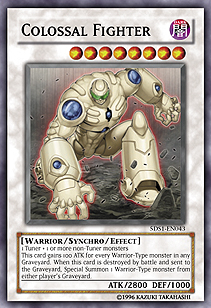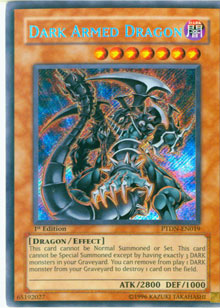I talk a lot about having to use answers to solve problems. This is because to me, that’s exactly how this game should be played. I approach every duel with a general game plan depending on what deck I’m using. Then, despite the fact that each deck has its own unique strategy, I attack the game the same way with every deck. I make moves that the opponent is going to have difficulty taking advantage of, and I work to solve any scenario he or she can create for me.
This style of play has not been adopted across the board. Many players like to try and solve one or two problems and counter by rushing the opponent. I believe this to be acceptable only when you’re winning the game or achieving a game-winning set-up. The problem with this approach lies in the fact that you usually don’t know if you’re going to win the game or end with a concrete game position. Barring Trap Dustshoot or Crush Card Virus, you don’t really know what your opponent has face down. You could push for game and possibly capture the win, but if your opponent has an answer you might be left without enough cards to compete.
The idea that your opponent could have anything is the basis from which my strategy is used. Mirror Force or Torrential Tribute can save your opponent the game if you play all your monsters to try and attack for victory. Those power cards can even turn the game right around, destroying all your monsters and leaving you defenseless. But it doesn’t even have to be a power play that wins you the game. If one player goes for a duel-ending attack and the other has any defense (devastating or not) and you’re unable to complete the game charge, chances are you’ve given your opponent a big opening that he or she can exploit.
Imagine playing out your hand in an attempt to win the game. You Synchro summon Stardust Dragon and Colossal Fighter, then drop Dark Armed Dragon. You’ve got enough ATK on the field to win, so you remove one Dark monster from your graveyard to destroy your opponent’s single back-row card with Dark Armed Dragon’s effect. In response he or she chains that card, flipping Phoenix Wing Wind Blast  and sending Stardust back to your extra deck. Suddenly, you’re unable to win the game that turn and can’t really protect your field. You’ve used three or four cards to make the game-shot combo work, so you can only really have another two or three cards left to use. Your opponent has used one card, and might have another five or six at his or her disposal.
and sending Stardust back to your extra deck. Suddenly, you’re unable to win the game that turn and can’t really protect your field. You’ve used three or four cards to make the game-shot combo work, so you can only really have another two or three cards left to use. Your opponent has used one card, and might have another five or six at his or her disposal.
You can see how you might be in trouble here. Assuming you have the same quality cards in your hand as your opponent does, you’re outgunned about two to one. But chances are you don’t have as many good cards left as your opponent does. If you had a second Dark Armed Dragon, you would have played it for game. Chances are you’re left with something like Reinforcement of the Army, Destiny Hero - Doom Lord and Solemn Judgment. That’s not going to do much against an opponent who’s got the same kind of cards you just used.
Only now your opponent uses his or her power cards to rid you of yours. Now that player is left with those good cards on the field while yours are gone. You’re left with some bad cards in hand. Even if you’re able to muster up enough offense to solve what your opponent has on his or her field, the opponent can just drop whatever he or she has got left over to take care of your rags after the fact.
As you can see, openly displaying the power of your hand isn’t necessarily the best strategy. If your established position is strong enough (or your opponent’s hand is bad enough) then playing this way will work. Otherwise you’ll need to adopt a different style of play. My suggestion? Be a problem-solving kind of player. It’s much harder to deal with an opponent who isn’t committing to the field. If you’re unable to game your opponent or set up a game-winning condition, the best way to play is conservatively. Assuming you’re still alive at the end of each of your opponent’s turns, the winner of the game is going to be the one who’s still got cards to play when the other player runs out.
That’s the so-called "card advantage" concept. The player who has the most cards left when both players have few to no cards wins. The key condition is that you need to be able to keep your life points above zero the entire time. It does no good to save all your cards from Heavy Storm if your opponent is just going to win the game that turn anyway. The other thing to consider is that those cards you’ve got left need to be useful. It does you no good to be holding four completely unplayable cards when your opponent’s just beating you down with Stratos.
Can a player using a strategy like this actually win? How can you make sure you’re the last player to run out of cards every time? Shouldn’t luck give your opponent more answers than you get every once and a  while? The answer is yes, luck occurs, and yes you can make sure you’re the one who’s left with more cards at the end of every game. This is where individual skill comes into play. In order to gain the upper hand in these matches you have to do one of two things:
while? The answer is yes, luck occurs, and yes you can make sure you’re the one who’s left with more cards at the end of every game. This is where individual skill comes into play. In order to gain the upper hand in these matches you have to do one of two things:
The first is to take care of multiple answers at once. Crush Card Virus, Morphing Jar, Heavy Storm, Torrential Tribute, and Dark Armed Dragon are just a few of the many cards used these days that address many different threats in a single effect. Morphing is particularly good, negating any damage your opponent could have caused with the cards in his or her hand and basically allowing both players to start over.
Secondly, you’ll have to make your opponent waste cards on your stuff. Having him or her use cards on self-replacing monsters like Sangan or Elemental Hero Stratos takes away a card from the opponent while doing nothing to your overall card presence. That’s just one small step toward victory, but every wasted option counts, and that’s why you see these cards in almost everyone’s deck. It’s why Stratos was so good in Gladiator Beasts.
For proof that this strategy can win I suggest you look no further than the success of Jason Holloway at Shonen Jump Championship Tulsa. He played a deck completely dependent on solving tough game positions and other problems while never really achieving any set-ups himself. It was either win the game or move to a more advantageous position. Jason came in third place with this strategy, so it definitely works.
—Matt Peddle